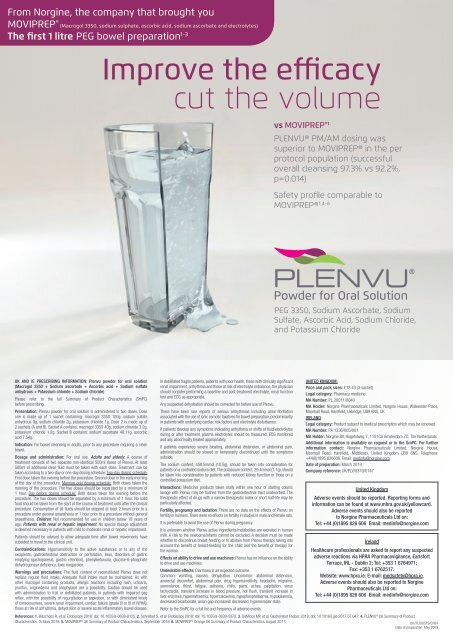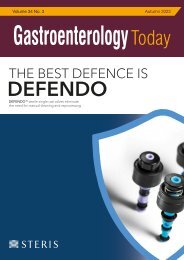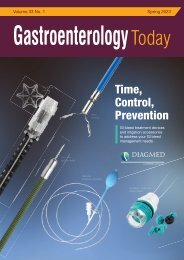Create successful ePaper yourself
Turn your PDF publications into a flip-book with our unique Google optimized e-Paper software.
From Norgine, the company that brought you<br />
MOVIPREP<br />
NEWS<br />
® (Macrogol 3350, sodium sulphate, ascorbic acid, sodium ascorbate and electrolytes)<br />
The first 1 litre PEG bowel preparation 1-3<br />
Improve the efficacy<br />
cut the volume<br />
vs MOVIPREP ®1<br />
PLENVU® PM/AM dosing was<br />
superior to MOVIPREP® in the per<br />
protocol population (successful<br />
overall cleansing 97.3% vs 92.2%,<br />
p=0.014)<br />
Safety profile comparable to<br />
MOVIPREP® 1,4-6<br />
Powder for Oral Solution<br />
PEG 3350, Sodium Ascorbate, Sodium<br />
Sulfate, Ascorbic Acid, Sodium Chloride,<br />
and Potassium Chloride<br />
UK AND IE PRESCRIBING INFORMATION: Plenvu powder for oral solution<br />
(Macrogol 3350 + Sodium ascorbate + Ascorbic acid + Sodium sulfate<br />
anhydrous + Potassium chloride + Sodium chloride)<br />
Please refer to the full Summary of Product Characteristics (SmPC)<br />
before prescribing.<br />
Presentation: Plenvu powder for oral solution is administered in two doses. Dose<br />
one is made up of 1 sachet containing: macrogol 3350 100g, sodium sulfate<br />
anhydrous 9g, sodium chloride 2g, potassium chloride 1g. Dose 2 is made up of<br />
2 sachets (A and B). Sachet A contains: macrogol 3350 40g, sodium chloride 3.2g,<br />
potassium chloride 1.2g. Sachet B contains: sodium ascorbate 48.11g, ascorbic<br />
acid 7.54g.<br />
Indication: For bowel cleansing in adults, prior to any procedure requiring a clean<br />
bowel.<br />
Dosage and administration: For oral use. Adults and elderly: A course of<br />
treatment consists of two separate non-identical 500ml doses of Plenvu. At least<br />
500ml of additional clear fluid must be taken with each dose. Treatment can be<br />
taken according to a two-day or one-day dosing schedule. Two-day dosing schedule:<br />
First dose taken the evening before the procedure. Second dose in the early morning<br />
of the day of the procedure. Morning only dosing schedule: Both doses taken the<br />
morning of the procedure. The two doses should be separated by a minimum of<br />
1 hour. Day before dosing schedule: Both doses taken the evening before the<br />
procedure. The two doses should be separated by a minimum of 1 hour. No solid<br />
food should be taken from the start of the course of treatment until after the clinical<br />
procedure. Consumption of all fluids should be stopped at least 2 hours prior to a<br />
procedure under general anaesthesia or 1 hour prior to a procedure without general<br />
anaesthesia. Children: Not recommended for use in children below 18 years of<br />
age. Patients with renal or hepatic impairment: No special dosage adjustment<br />
is deemed necessary in patients with mild to moderate renal or hepatic impairment.<br />
GASTROENTEROLOGY TODAY - SUMMER <strong>2019</strong><br />
Patients should be advised to allow adequate time after bowel movements have<br />
subsided to travel to the clinical unit.<br />
Contraindications: Hypersensitivity to the active substances or to any of the<br />
excipients, gastrointestinal obstruction or perforation, ileus, disorders of gastric<br />
emptying (gastroparesis, gastric retention), phenylketonuria, glucose-6-phosphate<br />
dehydrogenase deficiency, toxic megacolon.<br />
Warnings and precautions: The fluid content of reconstituted Plenvu does not<br />
replace regular fluid intake. Adequate fluid intake must be maintained. As with<br />
other macrogol containing products, allergic reactions including rash, urticaria,<br />
pruritus, angioedema and anaphylaxis are a possibility. Caution should be used<br />
with administration to frail or debilitated patients, in patients with impaired gag<br />
reflex, with the possibility of regurgitation or aspiration, or with diminished levels<br />
of consciousness, severe renal impairment, cardiac failure (grade III or IV of NYHA),<br />
those at risk of arrhythmia, dehydration or severe acute inflammatory bowel disease.<br />
16<br />
In debilitated fragile patients, patients with poor health, those with clinically significant<br />
renal impairment, arrhythmia and those at risk of electrolyte imbalance, the physician<br />
should consider performing a baseline and post-treatment electrolyte, renal function<br />
test and ECG as appropriate.<br />
Any suspected dehydration should be corrected for before use of Plenvu.<br />
There have been rare reports of serious arrhythmias including atrial fibrillation<br />
associated with the use of ionic osmotic laxatives for bowel preparation, predominantly<br />
in patients with underlying cardiac risk factors and electrolyte disturbance.<br />
If patients develop any symptoms indicating arrhythmia or shifts of fluid/electrolytes<br />
during or after treatment, plasma electrolytes should be measured, ECG monitored<br />
and any abnormality treated appropriately.<br />
If patients experience severe bloating, abdominal distension, or abdominal pain,<br />
administration should be slowed or temporarily discontinued until the symptoms<br />
subside.<br />
The sodium content, 458.5mmol (10.5g), should be taken into consideration for<br />
patients on a controlled sodium diet. The potassium content, 29.4mmol (1.1g), should<br />
be taken into consideration by patients with reduced kidney function or those on a<br />
controlled potassium diet.<br />
Interactions: Medicinal products taken orally within one hour of starting colonic<br />
lavage with Plenvu may be flushed from the gastrointestinal tract unabsorbed. The<br />
therapeutic effect of drugs with a narrow therapeutic index or short half-life may be<br />
particularly affected.<br />
Fertility, pregnancy and lactation: There are no data on the effects of Plenvu on<br />
fertility in humans. There were no effects on fertility in studies in male and female rats.<br />
It is preferable to avoid the use of Plenvu during pregnancy.<br />
It is unknown whether Plenvu active ingredients/metabolites are excreted in human<br />
milk. A risk to the newborns/infants cannot be excluded. A decision must be made<br />
whether to discontinue breast-feeding or to abstain from Plenvu therapy taking into<br />
account the benefit of breast-feeding for the child and the benefit of therapy for<br />
the woman.<br />
Effects on ability to drive and use machines: Plenvu has no influence on the ability<br />
to drive and use machines.<br />
Undesirable effects: Diarrhoea is an expected outcome.<br />
Common: vomiting, nausea, dehydration. Uncommon: abdominal distension,<br />
anorectal discomfort, abdominal pain, drug hypersensitivity, headache, migraine,<br />
somnolence, thirst, fatigue, asthenia, chills, pains, aches, palpitation, sinus<br />
tachycardia, transient increase in blood pressure, hot flush, transient increase in<br />
liver enzymes, hypernatraemia, hypercalcaemia, hypophosphataemia, hypokalaemia,<br />
decreased bicarbonate, anion gap increased/ decreased, hyperosmolar state.<br />
Refer to the SmPC for a full list and frequency of adverse events.<br />
UNITED KINGDOM:<br />
Price and pack sizes: £12.43 (3 sachet)<br />
Legal category: Pharmacy medicine<br />
MA Number: PL 20011/0040<br />
MA Holder: Norgine Pharmaceuticals Limited, Norgine House, Widewater Place,<br />
Moorhall Road, Harefield, Uxbridge, UB9 6NS, UK<br />
IRELAND<br />
Legal category: Product subject to medical prescription which may be renewed<br />
MA Number: PA 1336/005/001<br />
MA Holder: Norgine BV, Hogehilweg 7, 1101CA Amsterdam ZO, The Netherlands<br />
Additional information is available on request or in the SmPC. For further<br />
information contact: Norgine Pharmaceuticals Limited, Norgine House,<br />
Moorhall Road, Harefield, Middlesex, United Kingdom UB9 6NS. Telephone:<br />
+44(0)1895 826606. Email: medinfo@norgine.com<br />
Date of preparation: March <strong>2019</strong><br />
Company reference: UK/PLV/0319/0147<br />
United Kingdom<br />
Adverse events should be reported. Reporting forms and<br />
information can be found at www.mhra.gov.uk/yellowcard.<br />
Adverse events should also be reported<br />
to Norgine Pharmaceuticals Ltd on:<br />
Tel: +44 (0)1895 826 606 Email: medinfo@norgine.com<br />
References: 1. Bisschops R, et al. Endoscopy 2018; doi: 10.1055/a-0638-8125. 2. Schreiber S, et al. Endoscopy 2018; doi: 10.1055/a-0639-5070. 3. DeMicco MP, et al. Gastrointest Endosc 2018; doi: 10.1016/j.gie.2017.07.047. 4. PLENVU ® UK Summary of Product<br />
Characteristics. October 2018. 5. MOVIPREP ® UK Summary of Product Characteristics. September 2018. 6. MOVIPREP ® Orange UK Summary of Product Characteristics. August 2017.<br />
UK/PLV/0519/0164<br />
Date of preparation: May <strong>2019</strong><br />
Ireland<br />
Healthcare professionals are asked to report any suspected<br />
adverse reactions via HPRA Pharmacovigilance, Earlsfort<br />
Terrace, IRL - Dublin 2; Tel: +353 1 6764971;<br />
Fax: +353 1 6762517.<br />
Website: www.hpra.ie; E-mail: medsafety@hpra.ie.<br />
Adverse events should also be reported to Norgine<br />
Pharmaceuticals Ltd on:<br />
Tel: +44 (0)1895 826 606 Email: medinfo@norgine.com

















